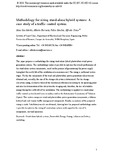Mostrar el registro sencillo del ítem
Methodology for sizing stand-alone hybrid systems: a case study of a traffic control system
| dc.creator | San Martín Biurrun, Idoia | es_ES |
| dc.creator | Berrueta Irigoyen, Alberto | es_ES |
| dc.creator | Sanchis Gúrpide, Pablo | es_ES |
| dc.creator | Ursúa Rubio, Alfredo | es_ES |
| dc.date.accessioned | 2023-05-09T15:37:15Z | |
| dc.date.available | 2023-05-09T15:37:15Z | |
| dc.date.issued | 2018 | |
| dc.identifier.citation | San Martín-Biurrun, I., Berrueta-Irigoyen, A., Sanchis-Gurpide, P., Ursúa-Rubio, A. (2018) Methodology for sizing stand-alone hybrid systems: A case study of a traffic control system. Energy, 153, 870-881. https://doi.org/10.1016/j.energy.2018.04.099. | en |
| dc.identifier.issn | 0360-5442 | |
| dc.identifier.uri | https://hdl.handle.net/2454/45273 | |
| dc.description.abstract | This paper proposes a methodology for sizing stand-alone hybrid photovoltaic-wind power generation systems. This methodology makes it possible to optimise the overall performance of the stand-alone system components, based on the premise of guaranteeing the power supply throughout the useful life of the installation at a minimum cost. The sizing is performed in two stages. Firstly, the components of the wind and photovoltaic power generation subsystem are obtained and, secondly, the size of the storage subsystem is determined. For the storage subsystem sizing, account is taken of the variation in efficiency according to the operating point and also the deterioration of the subsystem due to aging and, therefore, the loss of available energy during the useful life of the installation. This methodology is applied to a stand-alone traffic control system located on a secondary road in the Autonomous Community of Valencia (Spain). This system comprises wind and photovoltaic power generation components, a lithium battery bank and various traffic management components. Finally, an analysis of the proposed sizing is made. Satisfactory results are obtained, showing how the proposed methodology makes it possible to optimise the sizing of stand-alone systems with regard to the size of its components, cost and operation. | en |
| dc.description.sponsorship | This work has been supported by the Spanish State Research Agency (AEI) and FEDER-UE under grant DPI2013-42853-R, DPI2016-80642-R and DPI2016-80641-R; and by the Government of Navarre under project PIO38 INTEGRA-RENOVABLES. | en |
| dc.format.mimetype | application/pdf | en |
| dc.language.iso | eng | en |
| dc.publisher | Elsevier | en |
| dc.relation.ispartof | Energy, 153 (2018) | en |
| dc.rights | © 2018 Elsevier Ltd. This manuscript version is made available under the CC-BY-NC-ND 4.0 | en |
| dc.subject | Stand-alone hybrid systems | en |
| dc.subject | Renewable energy | en |
| dc.subject | Sizing | en |
| dc.subject | Lithium-ion battery | en |
| dc.subject | Modelling | en |
| dc.title | Methodology for sizing stand-alone hybrid systems: a case study of a traffic control system | en |
| dc.type | Artículo / Artikulua | es |
| dc.type | info:eu-repo/semantics/article | en |
| dc.date.updated | 2023-05-09T15:28:15Z | |
| dc.contributor.department | Ingeniería Eléctrica y Electrónica | es_ES |
| dc.contributor.department | Ingeniaritza Elektrikoa eta Elektronikoa | eu |
| dc.contributor.department | Institute of Smart Cities - ISC | en |
| dc.rights.accessRights | Acceso abierto / Sarbide irekia | es |
| dc.rights.accessRights | info:eu-repo/semantics/openAccess | en |
| dc.identifier.doi | 10.1016/j.energy.2018.04.099 | |
| dc.relation.projectID | info:eu-repo/grantAgreement/MINECO//DPI2013-42853-R/ES/ | en |
| dc.relation.projectID | info:eu-repo/grantAgreement/AEI//DPI2016-80642-R | en |
| dc.relation.projectID | info:eu-repo/grantAgreement/MINECO//DPI2016-80641-R | en |
| dc.relation.projectID | info:eu-repo/grantAgreement/Gobierno de Navarra//PIO38 INTEGRA-RENOVABLES | en |
| dc.relation.publisherversion | https://doi.org/10.1016/j.energy.2018.04.099 | |
| dc.type.version | Versión aceptada / Onetsi den bertsioa | es |
| dc.type.version | info:eu-repo/semantics/acceptedVersion | en |


